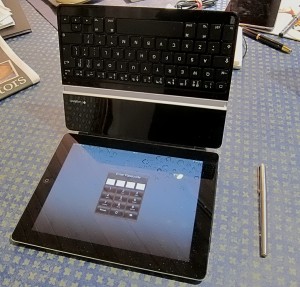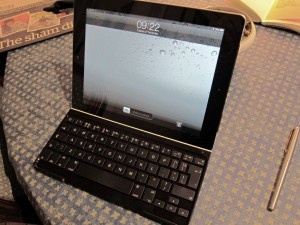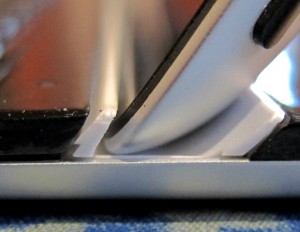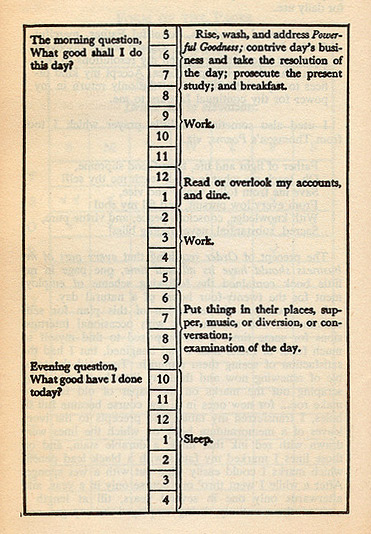The custodian at Brancaster Staithe.
Thinking about the unthinkable
This morning’s Observer column.
Then Google launched its autonomous vehicle (aka self-driving car) project. By loading a perfectly ordinary Toyota Prius with $250,000-worth of sensors and computing equipment, the company created a vehicle that can safely navigate even the more congested road conditions. So far, these cars have logged something like half-a-million accident-free miles, which implies that robotic cars are actually far safer than ones driven by humans.
For me, the implication of the Google car is not necessarily that Kurzweil’s “singularity” is near, but that our assumptions about the potential of computers – and, therefore, artificial intelligence – urgently need revising. We need to think seriously about this stuff, along the lines demonstrated by the philosopher David Chalmers in a terrific paper, or by Erik Brynjolfsson and Andrew McAfee in their book, Race Against the Machine.
Agribusiness: full steam ahead
An East Anglian sugar-beet factory in full production.
Larger size here.
Norfolk sunset
It was bitterly cold on the coast yesterday. But beautiful — as usual.
HDR shot using iPhone.
The Leveson Prescription: and why it’s unlikely to work
Lord Leveson’s prescription for the British press is a cunning mixture of carrot and stick. The carrot consists of the incentives offered to newspapers who opt in to the ’voluntary’ new self-regulation scheme — basically liberation from the swingeing risks of old-style libel litigation. The stick is that newspapers that do not opt in have to subject themselves to a statutory regulator — OFCOM — which has no experience of the newspaper industry. The problem with this prescription is that it does not address the biggest problem with the British tabloids, which is that they are fiendishly attractive to the great British public.
This was the elephant in Lord Leveson’s court-room throughout his hearings, and yet nobody was tactless enough to draw attention to it. But it goes to the heart of the matter. The reason there are such appalling abuses of newspaper power in Britain is that the products of these abuses are so popular. Bad behaviour is rewarded by newspaper sales, and is therefore incentivised within the industry. If the British public really disapproved of what the News of the World et al were doing, then the remedy was obvious: people could have boycotted the paper. But they didn’t. The biggest-selling newspapers in Britain are all publications that are ethically challenged. What Lord Leveson ignored was the fact that Britain gets the newspapers it deserves. And that is something that neither self-regulation nor statute will change.
Google+ vs Facebook
Or: what is Google+ for?
I like his sandwich-board metaphor.
Speed-reading day
The Leveson Report on the “culture, practice and ethics” of the British press is being published today at 1.30pm — the time when Lord Justice Leveson is giving a press conference in the QE Conference Centre in Whitehall. The report is apparently 2000 pages long and so even as I write (at 9am) all over London hacks who have signed a non-disclosure agreement in blood are locked in rooms frantically trying to speed-read it. The rest of us can see it for ourselves — it will be downloadable from the Leveson Inquiry site this afternoon.
Augmenting the iPad
As some readers of this blog may remember, I was sceptical about the iPad when it first appeared, mainly because it didn’t have the software ecosystem that I needed. I could see that it was a terrific device for media consumption, but initially it was hopeless for anyone who, like me, spends most of their time creating stuff. Over time, however, the software ecosystem materialised and — rather to my astonishment — I found that the device had become an almost-indispensable working tool. Apart from the software (terrific stuff like DropBox, SoundNote and iThoughtsHD, iAWriter and Day One) the key factors were the instant-on feature, the ten-hour battery life and a 3G SIM card — which meant that I could, for example, do a whole working day away from base and never have to look for either a power socket or an Internet connection. Bliss!
But one snag remained — the on-screen keyboard, which I found ok for short messages and notes, but a real pain for long-form typing (partly because I’ve never been able to stop myself hitting ‘m’ instead of the spacebar, which meansmthatmmanymofmmymmessagesmcome outmlooking likemthis). So of course I looked round for a bluetooth keyboard — and remembered that I had a neat little Apple one, which works fine with the iPad but means that I wound up lugging two devices around and wondering if it would have made more sense to bring a MacBook Air instead.
Then the Microsoft Surface appeared, and many of the reviewers remarked on the fact that the covers for the device include a keyboard. It seemed such a good idea, so I started looking for an equivalent for the iPad. Last week I found one. It’s the Logitech Ultrathin Keyboard Cover. It clips magnetically to the iPad — just as the original covers for the iPad2 do — but contains a real keyboard with moving keys.
Logitech claims that one will get six months of normal usage from the (USB-rechargeable) battery. It does add slightly to the weight of the iPad, and in tactile terms is slightly inferior to, and more more cramped than, the Apple bluetooth keyboard.
But it has a really neat groove with holds the iPad securely at an angle and overall is a really clever solution to a design problem. Recommended.
Popemobility
From the you-couldn’t-make-it-up department, a report in today’s Irish Times.
It was first used to enable Pope John Paul II to safely navigate the throngs who turned out for his historic visit to Ireland in 1979 – but from tomorrow the iconic Popemobile will be available for hire for stag and hen parties and corporate gigs.
The venture is the brainchild of businessman Paddy Dunning, who came into ownership of the Popemobile when he acquired the Wax Museum some years ago from former politician Donie Cassidy.
Mr Dunning has given the Popemobile a €60,000 makeover and added a Mercedes chassis. It will hit the road again tomorrow, when it will be showcased along with wax statues of Jedward at the Wax Museum in Dublin.
According to a promotional pack, the vehicle has 15 seats, including the original “pope’s chair”. Mr Dunning plans to charge up to €300 an hour plus VAT for use of it .
He said the chair used by the pope was kept in his mother’s home in Greenhills, Dublin, while the vehicle’s makeover was completed.
“Nuns over from Rome were in my mother’s house to see it,” he said.
The promotional pack lists a number of possible uses, including “hen and stag [nights], Debs and photo calls”.







